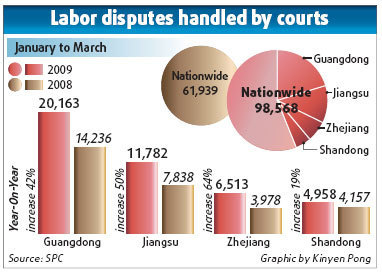The number of labor disputes heard by courts has skyrocketed this year with many employees choosing legal avenues before trying to sort out problems with their bosses, experts said on Tuesday.
Figures from the Supreme People's Court (SPC) showed 98,568 cases in the first three months this year, a 59-percent year-on-year rise.
"Amid the global financial crisis, the number of businesses going into the red or going bankrupt continues to grow, leading to more disputes over salary claims," said Du Wanhua, chief of the SPC's No 1 civil trials tribunal.
"Ever since the implementation of the Labor Contract Law in January 2008, workers have become more aware of their rights and the legal avenues available to safeguard them."
A revision of regulations on lawsuit fees in 2007 reduced costs to 10 yuan ($1.50) per case, while at some courts they are free. Previously, costs were based on the amount of money involved.

Wang Linqing, a professor of civil law at Renmin University of China, told China Daily that the economic downturn and the revised laws could be putting more pressure on the courts, with some workers filing lawsuits as a first step rather than discussing the issues with their employers.
Wang suggested that more out-of-court mediation be used with extensive participation of government departments, labor unions, residents' or villagers' committees as well as mediators.
Qiu Baochang, dean of Beijing-based Huijia Law Firm, agreed.
"Workers should not rely solely on the courts and arbitration committees. Fair labor treatment can also be achieved through negotiations between workers and enterprises," Qiu said.
The law, which took effect last year, includes clauses on overtime payment, compensation for contract termination and wages for departing staff who had served at least one year.
Last year, 286,221 disputes were heard, a 93-percent rise on 2007, with the number nearly tripling in some coastal cities.
Courts in Guangdong province heard 20,163 labor disputes during the first three months this year, up 41.6 percent year-on-year, the SPC data showed, while in Jiangsu and Zhejiang provinces the figures jumped 50 and 64 percent to 11,782 and 6,513.
Zhejiang has been one of the worst hit by the financial crisis, with more than 1,200 enterprises halting production or going bust over the past 12 months - almost as many as in the previous 10 years, Hong Kong media reported in February.
In the past, most disputes were related to damages for injuries or payment, but there has been a sharp rise in workers claiming back pay for social insurance and pensions, as well as lawyers, accountants and auditors suing employers for grievances related to the process of signing, terminating or halting labor contracts
Fearing an increase in disputes might affect social stability, the SPC has been working on a judicial interpretation of the Labor Contract Law since last July to uniform trial standards nationwide.
"We encourage enterprises to assume more social responsibility, and try not to lay off workers or reduce salaries. On the other hand, we suggest workers show more understanding toward enterprises in financial difficulties," Du said.
Still, courts will punish such violations as arbitrary retrenchment, and guide employees and enterprises in resolving disputes through shorter working hours, training shifts, temporary vacations or salary negotiations, Du added.
(China Daily April 22, 2009)